| Listing 1 - 10 of 16 | << page >> |
Sort by
|
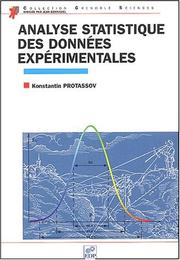
ISBN: 2868835902 9782868835901 Year: 2002 Publisher: Les Ulis: EDP sciences,
Abstract | Keywords | Export | Availability | Bookmark
 Loading...
Loading...Choose an application
- Reference Manager
- EndNote
- RefWorks (Direct export to RefWorks)
Après une brève présentation des causes d'incertitudes, les distributions de probabilités les plus connues (Gauss, binomiale, Poisson) sont exposées. Ensuite, des notions plus complexes de statistique sont abordées : fonction d'une variable aléatoire, propagation des erreurs, échantillon, valeur moyenne et écart-type expérimentaux, distributions x2 et Student. Cette partie présente toute une panoplie d'outils nécessaires pour l'analyse approfondie des données expérimentales dans différentes situations (volume limité de données expérimentales, comparaisons des résultats, erreurs systématiques, etc.). Un chapitre spécial est consacré à l'ajustement des paramètres par la méthode des moindres carrés et par la méthode du maximum de vraisemblance. Des conseils pratiques sont donnés. Ils permettent d'améliorer les mesures et leur analyse. Cet ouvrage est destiné aux étudiants de second cycle universitaire et à tous les scientifiques et professionnels qui ont obtenu ce niveau. [Source : d'après la 4e de couverture]
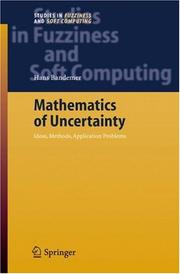
ISBN: 3540284575 9786610427710 128042771X 3540312285 9783540284574 Year: 2006 Volume: 189 Publisher: Berlin ; London : Springer,
Abstract | Keywords | Export | Availability | Bookmark
 Loading...
Loading...Choose an application
- Reference Manager
- EndNote
- RefWorks (Direct export to RefWorks)
"Mathematics of Uncertainty" provides the basic ideas and foundations of uncertainty, covering the fields of mathematics in which uncertainty, variability, imprecision and fuzziness of data are of importance. This introductory book describes the basic ideas of the mathematical fields of uncertainty from simple interpolation to wavelets, from error propagation to fuzzy sets and neural networks. The book presents the treatment of problems of interpolation and approximation, as well as observation fuzziness which can essentially influence the preciseness and reliability of statements on functional relationships. The notions of randomness and probability are examined as a model for the variability of observation and measurement results. Besides these basic ideas the book also presents methods of qualitative data analysis such as cluster analysis and classification, and of evaluation of functional relationships such as regression analysis and quantitative fuzzy data analysis.
Book
Year: 1962 Publisher: Englewood Cliffs, N.J. : Prentice-Hall,
Abstract | Keywords | Export | Availability | Bookmark
 Loading...
Loading...Choose an application
- Reference Manager
- EndNote
- RefWorks (Direct export to RefWorks)
Book
ISBN: 2130475841 9782130475842 Year: 1996 Volume: 3110 Publisher: Paris: PUF,
Abstract | Keywords | Export | Availability | Bookmark
 Loading...
Loading...Choose an application
- Reference Manager
- EndNote
- RefWorks (Direct export to RefWorks)
Artificial intelligence. Robotics. Simulation. Graphics --- Probability theory --- Artificial intelligence --- Uncertainty (Information theory) --- Knowledge representation (Information theory) --- Intelligence artificielle --- Incertitude (Théorie de l'information) --- Représentation des connaissances --- Intelligence artificielle. --- Ensembles flous --- Artificial intelligence. --- Incertitude (Théorie de l'information) --- Représentation des connaissances
Book
ISBN: 0720433142 0444103783 9780720433142 Year: 1972 Volume: v. 14 Publisher: Amsterdam: North-Holland,
Abstract | Keywords | Export | Availability | Bookmark
 Loading...
Loading...Choose an application
- Reference Manager
- EndNote
- RefWorks (Direct export to RefWorks)
Statistical science --- Social sciences --- Distribution (Probability theory) --- Uncertainty (Information theory) --- Statistical methods --- Methodology --- 519.2 --- Probability. Mathematical statistics --- 519.2 Probability. Mathematical statistics --- Sciences sociales --- Incertitude (Théorie de l'information) --- Méthodologie --- Méthodes statistiques --- Social sciences - Statistical methods --- Social sciences - Methodology --- Statistique --- Modeles mathematiques
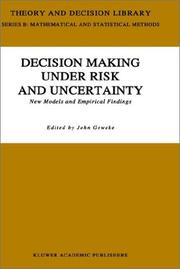
ISBN: 0792319044 9401052611 9401128383 Year: 1992 Volume: 22 Publisher: Dordrecht : Kluwer academic,
Abstract | Keywords | Export | Availability | Bookmark
 Loading...
Loading...Choose an application
- Reference Manager
- EndNote
- RefWorks (Direct export to RefWorks)
Decision making --- Risk --- Uncertainty (Information theory) --- Prise de décision --- Incertitude (Théorie de l'information) --- Mathematical models --- Congresses --- Modèles mathématiques --- Congrès --- Congresses. --- Prise de décision --- Incertitude (Théorie de l'information) --- Modèles mathématiques --- Congrès --- Decision-making - Mathematical models - Congresses. --- Risk - Mathematical models - Congresses. --- Uncertainty (Information theory) - Congresses.
Book
ISBN: 9782251443485 2251443487 Year: 2008 Publisher: Paris : les Belles lettres,
Abstract | Keywords | Export | Availability | Bookmark
 Loading...
Loading...Choose an application
- Reference Manager
- EndNote
- RefWorks (Direct export to RefWorks)
Quel est le point commun entre l'invention de la roue, Pompéi, le krach boursier de 1987, Harry Potter et Internet? Pourquoi ne devrait-on jamais lire un journal ni courir pour attraper un train? Que peuvent nous apprendre les amants de Catherine de Russie sur les probabilités? Pourquoi les prévisionnistes sont-ils pratiquement tous des arnaqueurs? Ce livre révèle tout des Cygnes Noirs, ces événements aléatoires, hautement improbables, qui jalonnent notre vie: ils ont un impact énorme, sont presque impossibles à prévoir, et pourtant, a posteriori, nous essayons toujours de leur trouver une explication rationnelle. Dans cet ouvrage éclairant, plein d'esprit et d'impertinence, Taleb nous exhorte à ne pas tenir compte des propos de certains "experts", et nous montre comment cesser de tout prévoir ou comment tirer parti de l'incertitude.
Uncertainty (Information theory) --- Forecasting. --- Economics --- Incertitude (Théorie de l'information) --- Prévision --- Economie politique --- Philosophy --- Philosophie --- Forecasting --- Social aspects --- 110 --- statistiques --- hasard --- wijsbegeerte overige werken --- philosophie autres ouvrages --- Uncertainty (Information theory) - Social aspects --- Incertitude (théorie de l'information) --- Prévision --- Aspect social
Book
ISBN: 0444109676 Year: 1976 Volume: 2 Publisher: Amsterdam : North-Holland,
Abstract | Keywords | Export | Availability | Bookmark
 Loading...
Loading...Choose an application
- Reference Manager
- EndNote
- RefWorks (Direct export to RefWorks)
Foreign trade. International trade --- Commerce --- International economic relations --- Investments --- Relations économiques internationales --- Investissements --- International economic relations. --- International trade. --- Investments. --- Physical distribution of goods --- Welfare economics --- Uncertainty (Information theory) --- Measurement uncertainty (Statistics) --- Business mathematics --- Distribution (Economie politique) --- Economie du bien-être --- Incertitude (Théorie de l'information) --- Incertitude de mesure --- Mathématiques financières --- Mathematical models --- Mathematics --- Modèles mathématiques --- Mathématiques --- Economie du bien-être --- Incertitude (Théorie de l'information) --- Mathématiques financières --- Relations économiques internationales --- Modèles mathématiques --- Mathématiques
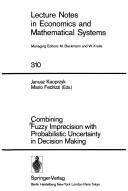
ISBN: 3540500057 0387500057 3642466443 Year: 1988 Volume: 310 Publisher: Berlin Springer
Abstract | Keywords | Export | Availability | Bookmark
 Loading...
Loading...Choose an application
- Reference Manager
- EndNote
- RefWorks (Direct export to RefWorks)
In the literature of decision analysis it is traditional to rely on the tools provided by probability theory to deal with problems in which uncertainty plays a substantive role. In recent years, however, it has become increasingly clear that uncertainty is a mul tifaceted concept in which some of the important facets do not lend themselves to analysis by probability-based methods. One such facet is that of fuzzy imprecision, which is associated with the use of fuzzy predicates exemplified by small, large, fast, near, likely, etc. To be more specific, consider a proposition such as "It is very unlikely that the price of oil will decline sharply in the near future," in which the italicized words play the role of fuzzy predicates. The question is: How can one express the mean ing of this proposition through the use of probability-based methods? If this cannot be done effectively in a probabilistic framework, then how can one employ the information provided by the proposition in question to bear on a decision relating to an investment in a company engaged in exploration and marketing of oil? As another example, consider a collection of rules of the form "If X is Ai then Y is B,," j = 1, . . . , n, in which X and Yare real-valued variables and Ai and Bi are fuzzy numbers exemplified by small, large, not very small, close to 5, etc.
Probability theory --- Statistical decision --- Fuzzy sets --- Uncertainty (Information theory) --- Prise de décision (Statistique) --- Ensembles flous --- Incertitude (Théorie de l'information) --- Management --- Business & Economics --- Management Theory --- 519.226 --- Decision problems --- Game theory --- Operations research --- Statistics --- Management science --- Sets, Fuzzy --- Fuzzy mathematics --- Set theory --- Inference and decision theory. Likelihood. Bayesian theory. Fiducial probability --- Fuzzy sets. --- Statistical decision. --- 519.226 Inference and decision theory. Likelihood. Bayesian theory. Fiducial probability --- Prise de décision (Statistique) --- Incertitude (Théorie de l'information)
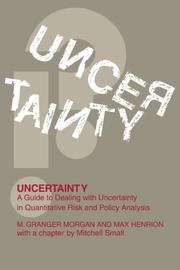
ISBN: 0521365422 0521427444 1139930087 1139927175 0511840608 9780521365420 9780521427449 9780511840609 Year: 1992 Publisher: Cambridge : Cambridge university press,
Abstract | Keywords | Export | Availability | Bookmark
 Loading...
Loading...Choose an application
- Reference Manager
- EndNote
- RefWorks (Direct export to RefWorks)
The authors explain the ways in which uncertainty is an important factor in the problems of risk and policy analysis. This book outlines the source and nature of uncertainty, discusses techniques for obtaining and using expert judgment, and reviews a variety of simple and advanced methods for analyzing uncertainty.
Uncertainty (Information theory) --- Incertitude (Théorie de l'information) --- Uncertainty --- Risk --- Policy sciences --- Mathematical models. --- Mathematical models --- Uncertainty - Mathematical models. --- Risk - Mathematical models. --- Policy sciences - Mathematical models. --- Policy analysis --- Risk assessment. --- Uncertainty. --- Reasoning --- Analysis, Risk --- Assessment, Risk --- Risk analysis --- Risk evaluation --- Evaluation --- Monograph --- Health Sciences --- Psychiatry & Psychology --- Policy-making --- Policymaking --- Public policy management --- Uncertainty - Mathematical models --- Risk - Mathematical models --- Policy sciences - Mathematical models --- Quantitative methods (economics)
| Listing 1 - 10 of 16 | << page >> |
Sort by
|

 Search
Search Feedback
Feedback About UniCat
About UniCat  Help
Help News
News